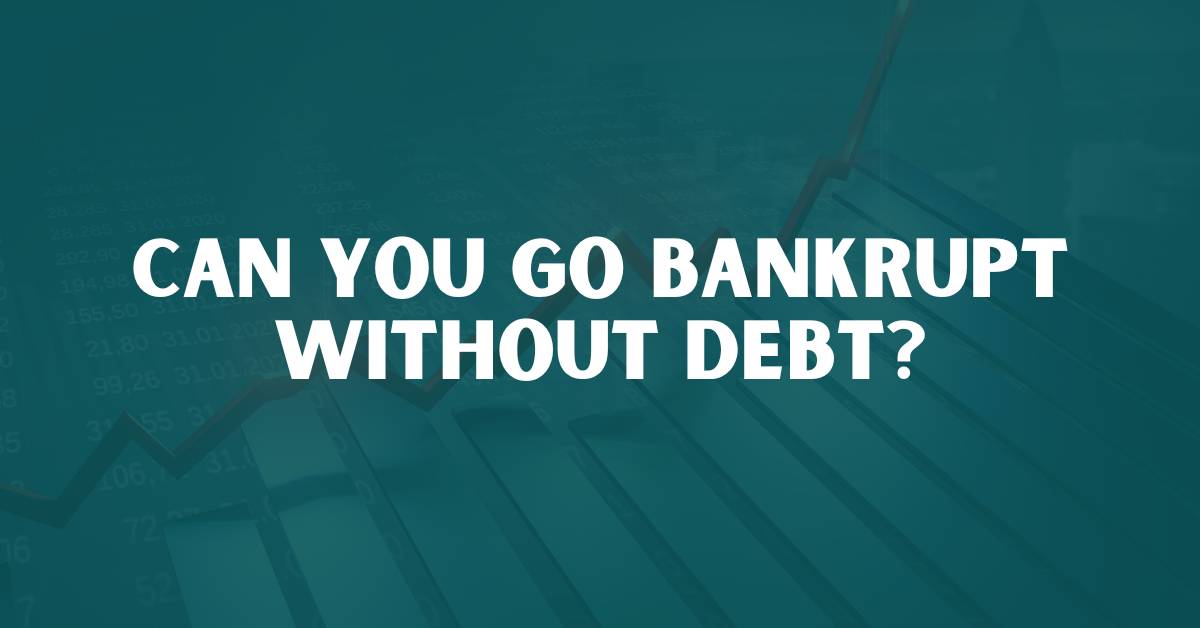Debt is one of the most common reasons individuals declare bankruptcy. You should know, however, that you can go bankrupt even if you don’t have any debt. Yes, it’s true! The law recognizes that there are many causes for an individual to be unable to pay their debts and limitations on how much they owe. In other words, you could be down on your luck for various reasons and find yourself in a position where bankruptcy is the only way out of a bad situation.
Debt will take years to pay off and eventually destroy your life until it’s all gone. So does this mean that you can’t go bankrupt without debt? The truth is that if you don’t have an obligation when you file for bankruptcy, you can technically. You will likely still have to go through the entire court process, but your bankruptcy will end with a discharge of all your debts.
The critical question at this point is why anyone would go bankrupt without any debt. Bankruptcy isn’t some magic solution that eliminates all your major problems in one swoop. It’s a complicated legal process that allows you to get rid of certain debts. To qualify for a discharge, you must be current on your debts and capable of paying them. However, bankruptcy is not an option if you have none or just very little debt.
Most people think that bankruptcy happens to people with huge amounts of debt. But it doesn’t have to be. You can go bankrupt without any debts at all. If you have no debts and assets, there is nothing to protect. When you file for bankruptcy, you liquidate your property to pay your creditors.
All your property becomes part of the bankruptcy estate, and the proceeds are used to pay off those who are owed money. However, if you don’t have anything in this estate, then what will they take? If all of your debts were paid entirely off before filing bankruptcy, it would make sense that a discharge would be granted without any problems.
The thing is, though, you will most likely still want to protect some of your assets. If you own a house, it might make sense to keep it. But then again, if you don’t have any debt on the house and can afford the mortgage payments each month, then it would make sense to release this asset from your bankruptcy case.
Here are a few of the reasons that bankruptcy is available to you.

1. You Have No Assets.
Your financial situation could be so dire, and your common assets so depleted that it’s impossible to pay off your debts from existing resources. This is what’s known as “absolute poverty.” When this occurs, you may qualify for bankruptcy because you’re in a position where filing for bankruptcy wouldn’t be an embarrassment or hardship for those who need to know about you.
2. Abuse of Credit.
You may not have been in a position to pay down your debts after taking them on, but you were able to use borrowed funds so extensively that you can’t even afford basic living expenses and necessities. This type of “extreme” abuse will make the court believe that it’s unfair or just that you should be permitted to keep any of your assets, including the things necessary for your subsistence.
3. You’re Unable To Pay Your Debts Because of Illness or Injury.
If you’re unable to work, you may become eligible for bankruptcy. If you have a permanent disability or illness, you may be incapable of earning enough to care for your debts.

4. You Lost Your Job and Cannot Find Another One Before Filing.
In this instance, you may be eligible for bankruptcy if you can prove that your lack of income results from something outside your control, such as being laid off.
5. Another Individual injured you in an Accident That Was Their Fault.
The debtor’s liability for damages caused by his negligence is unlimited in most cases, except for a few exceptions. One of those exceptions can be a case where the victim seeks to file for bankruptcy. Even though accidents are covered by insurance, this exception is considered too good to be true, so you may wish to consider acquiring additional coverage.
You should know that certain qualifications and requirements must be met before filing for bankruptcy. The following are a few of these conditions:
- You must have been an individual who owed debts at the time of filing.
- You must have been a citizen of the United States or a resident alien at the time of filing.
- You must have begun your bankruptcy case in the correct court.
- You must have been at least 18 years of age at the time you filed.
Many things can severely damage your credit score, but bankruptcy isn’t one of them. If you’re finding yourself with mounting debt and no way to pay it, it’s essential to understand your options before making rash decisions. You may be able to file for bankruptcy and get a new start.
